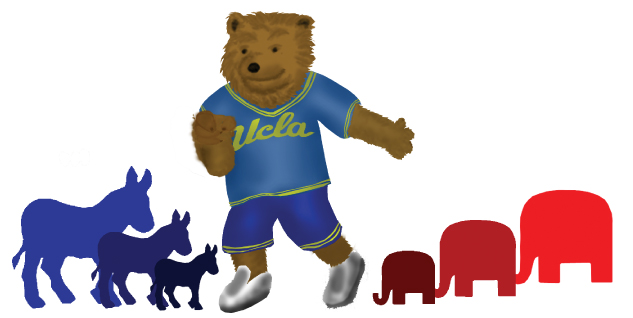Activism falls short of UCLA’s standard

By Francesca de la Fuente
Dec. 2, 2009 9:54 p.m.
Correction: The original version of this article contained an error. Attendance to Bruin Republican meetings has declined by about 10 members to an average of 20 to 25 people per meeting.
The buildup to the fee-hike protests on Nov. 18 and 19 promised something amazing. In the days leading up to the UC Board of Regents’ meeting, all I heard were rumors of police in riot gear, last-minute building switches to throw off protesting students and plans to bus in hundreds of students from other campuses. “This is going to be huge,” I thought. All of UCLA ““ all of the UC system ““ would be showing its anger.
The reality of what happened punctured that little daydream
Last year, I took part in a rally against Sarah Palin when she made a campaign stop near my hometown. I went as often as schoolwork allowed to protest against Proposition 8 on street corners and fliered (Yes, I fliered, like the students on Bruin Walk) in the local shopping mall. This was on top of registering people to vote, phone banking, poll-watching and going door to door in my neighborhood campaigning for President Barack Obama.
In short, I was politically active, and it was great. It was like something right out of Idealism 101 ““ Democracy! Civil demonstrations! Activism!
Now I realize how much I took that political activity for granted ““ it was natural to just wake up and think, “I’ll go out today and protest Prop 8. Or maybe tomorrow!” My one-woman campaign probably didn’t make much of a difference next to the other millions of people who also campaigned for Obama, but I could do it. And so I did, even though the effect of my contribution, especially in California, was most likely negligible, purely idealistic at best. It was at UCLA where I expected the real, hands-on, heavily involved political action to go down.
The fee-hike protests were dishearteningly small ““ about 600 people protested outside Covel Commons on Nov. 19.
I find this to be absurd and just a bit embarrassing. UCLA has a long, rich history of political activism. In 1972, about 2,000 students protested against President Richard Nixon’s foreign policy decisions in Vietnam by briefly taking over Westwood.
Three years earlier, the same number of students attended a lecture by Angela Davis, a controversial communist professor whom the Regents had been trying to fire. The result of the students’ continual support eventually led to a reversal of the Regents’ decision to fire Davis and an abolition of the UC system’s politically biased hiring rules.
In 1998, there were the Days of Defiance against Proposition 209, which ended affirmative action, during which Undergraduate Students Association Council President Kandea Mosley refused to endorse Albert Carnesale as UCLA Chancellor for his noncommittal stance, and hundreds of students rallied over the course of several days.
The local political groups on campus have suffered from a severe decrease in membership, reflecting the lack of student activism and protest.
Membership in Bruin Democrats approached 80 reliable members last year at the height of Obama-mania, said current Bruin Democrats President Carrie McFadden. That’s not counting the 50 or so members who came on an irregular basis. Now, membership has dropped significantly, to about 30 or 40 steady members.
The Bruin Republicans are also experiencing a decrease in meeting attendance. They’re now down to by 10 members to an average of 20 to 25 people per meeting, said Andrew Kreitz, the group’s chairman and a fourth-year business economics student.
A school known for its liberal student body has barely 40 people in a group representing one of our major political parties? The best we can turn out for a protest against fee hikes is only 600 people? Next to UCLA’s past protests and demonstrations, these are paltry numbers.
Yes, the national election cycle is over, but that is no reason for political activity to stop completely.
While one person might not make a huge difference in a national presidential campaign encompassing millions of people, on a school campus, that person’s contribution to political issues carries more weight.
The protests on Nov. 18 and 19 should have had every student possible present. The UC Regents are not directly accountable to students, but they respond to negative press ““ as in, the bigger the furor and outcry over their decisions, the more likely they are to rethink those decisions. Six hundred people ““ from almost all the UC campuses, and not even all students ““ were not enough.
I talked to friends who didn’t protest, convinced as they were that the addition of a few more participants would not make a difference in the Regents’ vote. I beg to differ. People have a tendency to “follow the leader”: If enough people join the protest, it has a cascading effect until there are huge crowds ““ crowds massive enough to make the regents take our protests seriously and into consideration. UCLA desperately needs every single person if we want to make an impact.
Students frequently believe that they, as individuals, will not be able to do much for their school. But the protests gave us a chance to rally for change, for action, en masse ““ not just as mere individuals, but as a united group.
But how many students actually took that opportunity? Were you angry about the fee hikes? Did you let the regents know about your anger? Or were you just not angry enough?
E-mail de la Fuente at [email protected]. Send general comments to [email protected].


